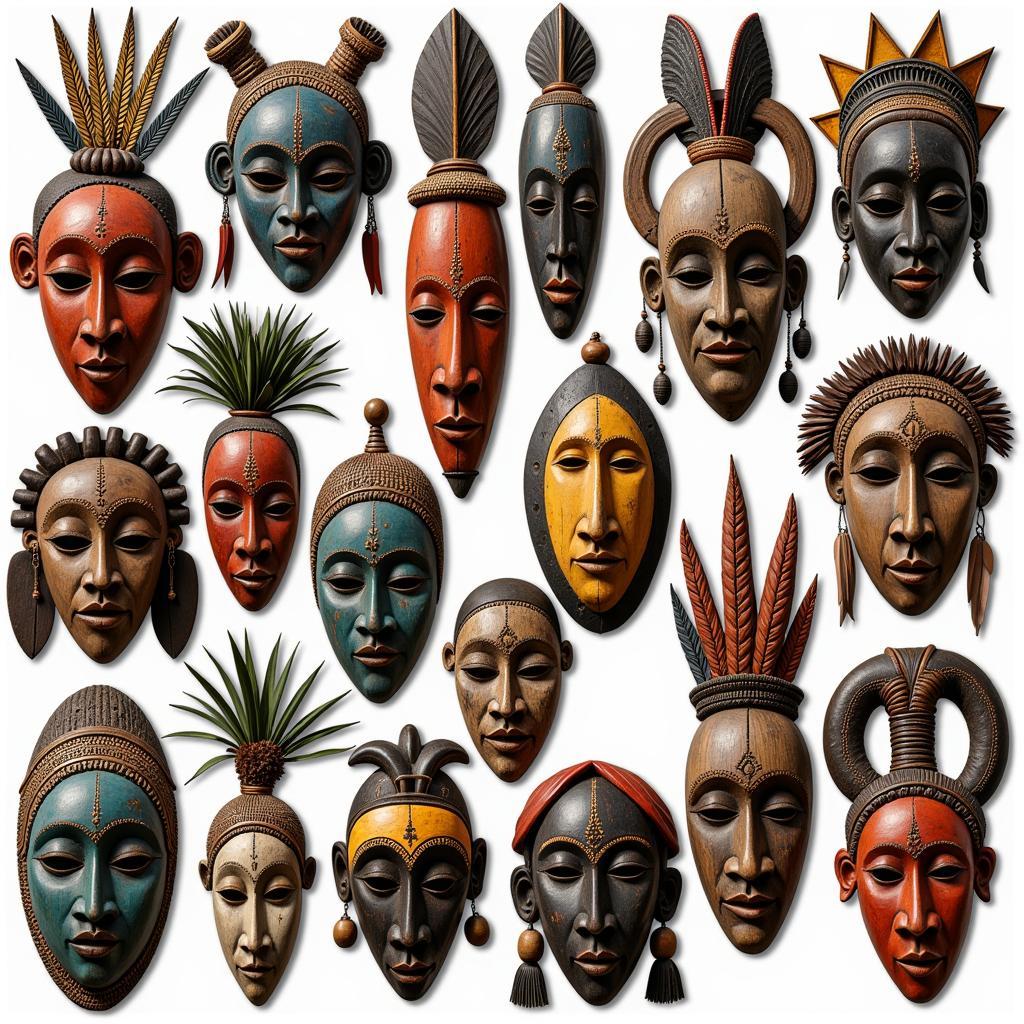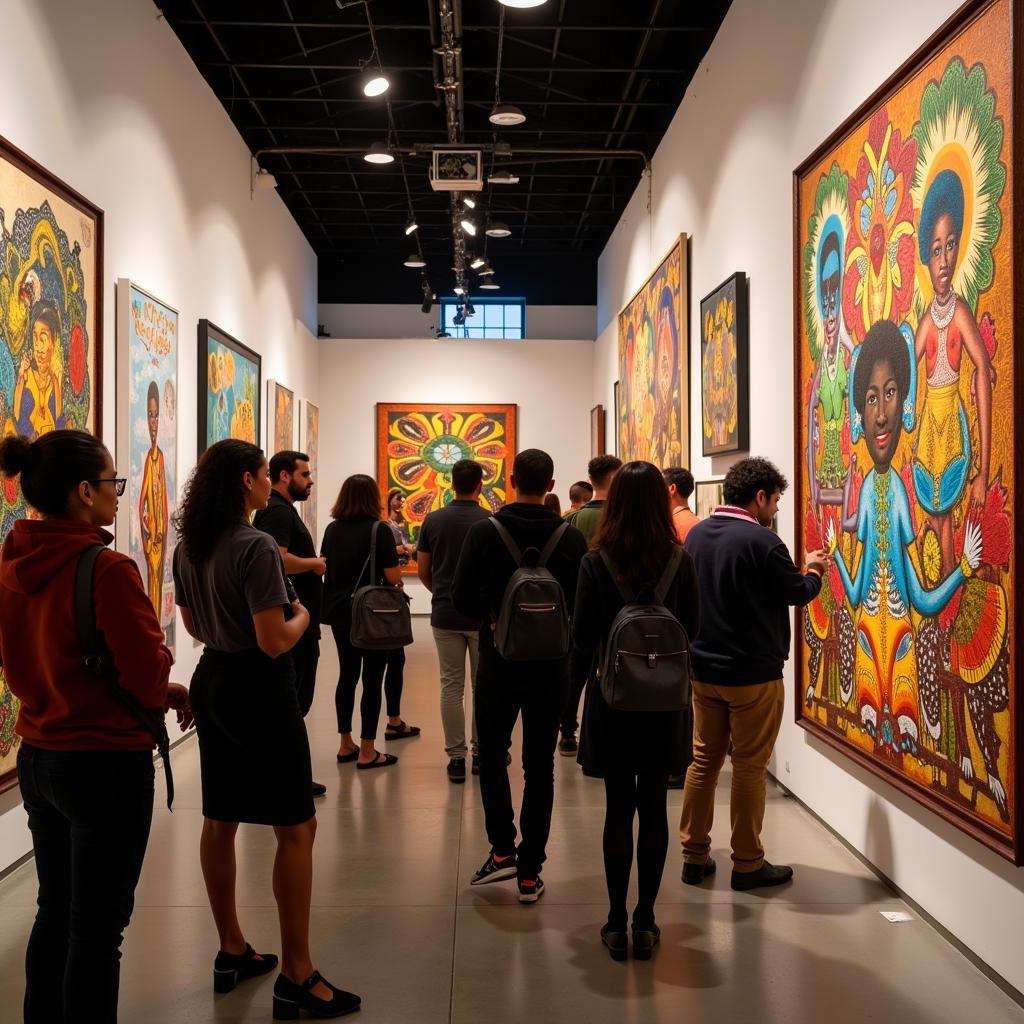Unveiling the African Jocono: A Journey into African Art and Culture
The term “African Jocono” sparks curiosity, hinting at a hidden treasure trove of artistic expression within the vibrant tapestry of African culture. It invites us to explore the captivating world of African art, moving beyond the familiar narratives and delving into the unique styles, symbolism, and stories woven into its rich history.
Beyond the Canvas: Understanding the “African Jocono” Concept
The “African Jocono” isn’t a single artwork, but rather a metaphorical representation of the diverse and profound artistic heritage found across the African continent. It challenges us to rethink our understanding of art, recognizing the depth and complexity of African aesthetics. This encompasses not only traditional painting and sculpture, but also encompasses various forms like mask-making, pottery, textiles, body art, and even architecture.
Exploring the Diversity of “African Joconos”
 African Masks Used in Ceremonial Rituals
African Masks Used in Ceremonial Rituals
African art varies dramatically from region to region, reflecting the unique histories, beliefs, and environments of different communities. From the intricate bronze castings of Benin to the vibrant Ndebele paintings of South Africa, each style offers a glimpse into a distinct cultural world. For example, the Nok culture of Nigeria, dating back to 1000 BC, left behind terracotta sculptures that demonstrate remarkable skill and artistic vision. Similarly, the vibrant textiles of the Ashanti people in Ghana, with their intricate patterns and symbolic meanings, tell stories of history and tradition.
The Power of Symbolism in “African Joconos”
African art is often deeply imbued with symbolism, reflecting spiritual beliefs, social structures, and the relationship between humans and the natural world. Masks, for instance, play a crucial role in many African cultures, representing spirits, ancestors, or mythical figures during ceremonies and rituals. The use of specific colors, patterns, and materials often carries symbolic weight, adding layers of meaning to the artwork.
“African Joconos” and the Storytelling Tradition
Many forms of African art serve as visual narratives, conveying stories, myths, and historical events. From intricate carvings on wooden stools to elaborate murals adorning the walls of homes, these artistic expressions transmit knowledge and cultural values across generations.
“African art is not just about aesthetics; it’s about communication. It’s a language that speaks to the soul and connects us to the past.” – Dr. Anika Olajumoke, Art Historian and Curator, Lagos, Nigeria.
The Impact of “African Joconos” on the Global Art Scene
 Contemporary African Art Exhibition: Global Influence
Contemporary African Art Exhibition: Global Influence
African art has had a profound impact on the global art scene, inspiring artists and movements across the world. From Picasso’s Cubism to the vibrant colors of Matisse, the influence of African aesthetics can be seen in various forms of modern and contemporary art. Today, African artists continue to push boundaries and challenge conventional notions of art, gaining increasing recognition on the international stage.
“The beauty of African art lies in its authenticity and its ability to connect us to something deeper than ourselves.” – Professor Kwame Asante, African Art Scholar, Accra, Ghana
Conclusion: Appreciating the Enduring Legacy of “African Joconos”
The “African Jocono” reminds us of the power of art to transcend boundaries and connect us to different cultures and perspectives. By exploring the diverse artistic traditions of Africa, we gain a deeper understanding of the continent’s rich history, spiritual beliefs, and enduring creativity.
FAQ
-
What does “African Jocono” mean?
It’s a metaphorical term referring to the diverse and significant artistic heritage of Africa. -
What are some examples of “African Joconos”?
Examples include masks, sculptures, textiles, pottery, and rock art from various African cultures. -
What is the significance of symbolism in African art?
Symbolism conveys spiritual beliefs, social structures, and the relationship between humans and nature. -
How has African art influenced the global art scene?
It has inspired artists and movements worldwide, particularly in modern and contemporary art. -
Where can I learn more about African art?
Museums, galleries, cultural centers, and online resources offer further exploration. -
What are some prominent African artists?
El Anatsui, Wangechi Mutu, and Ibrahim El-Salahi are just a few renowned contemporary African artists. -
How can I support African artists?
Purchasing art, attending exhibitions, and promoting their work are ways to support them.
Need support? Contact us 24/7: Phone: +255768904061, Email: kaka.mag@gmail.com, or visit us in Mbarali DC Mawindi, Kangaga, Tanzania.

